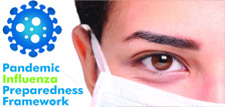 Influenza laboratory training in Rabat (Photo: WHO).
Influenza laboratory training in Rabat (Photo: WHO).
Seasonal influenza is a viral respiratory infection that affects the nose, throat, bronchi and, occasionally, the lungs. Infection usually lasts for about a week and is characterized by sudden onset of high fever, aching muscles and joints, headache and severe malaise, non-productive cough, sore throat and rhinitis.
Seasonal influenza is caused by human types of influenza viruses – influenza B, C and few sub-types of A – which circulate worldwide and can affect people in any age group. They are transmitted easily from person to person via droplets and small particles produced when infected people cough or sneeze.
The time from infection to illness is about 2 days. Most infected people recover within 1 to 2 weeks without requiring medical treatment. However, in high risk groups, including the very young, the elderly, and those with serious medical conditions, infection can lead to severe complications of the underlying condition, pneumonia and death. To prevent transmission, people should cover their mouth and nose when coughing and wash their hands regularly.
Influenza tends to spread rapidly in seasonal epidemics. Influenza epidemics can take an economic toll through lost workforce productivity and strained health services.
The most effective way to prevent influenza is vaccination. Safe and effective vaccines are available, and have been used for more than 60 years. Antiviral drugs are available for treatment, and may reduce severe complications and deaths. Ideally they need to be administered within 48 hours of the onset of symptoms although influenza viruses can develop resistance to the drugs.
Seasonal influenza is a viral respiratory infection that circulates in all parts of the world. It causes illnesses that range in severity from mild to severe. Influenza can cause major complications or death, particularly among high-risk groups including young children (6-59 months old), older adults (above 65 years), pregnant women, health workers and those with chronic medical conditions.
To support Member States in preparing for this winter season 2021-2022, the WHO Regional Office for the Eastern Mediterranean is providing these information resources for the benefit of high-risk groups and the general public. They include updated information on the disease, its modes of transmission and preventive measures that can be followed including the influenza vaccine. These materials are available in different formats including posters, Q&As, and videos. While the materials are available in Arabic, English and French, Member States can translate them into other local languages as needed.
Latest updates




